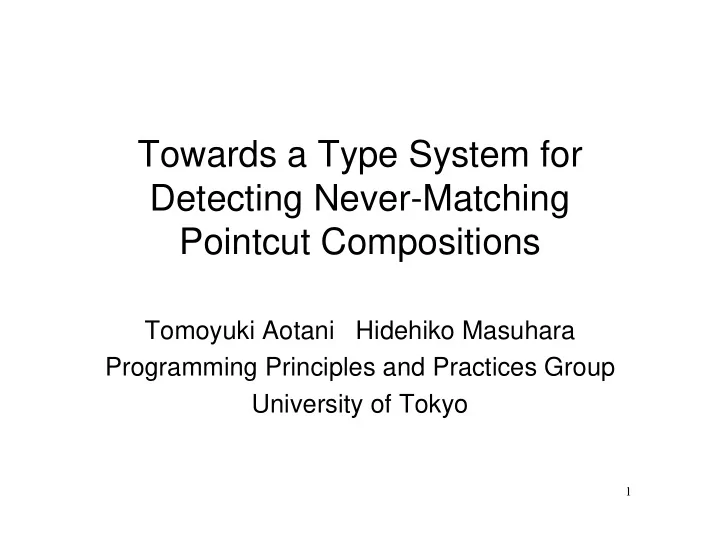

Towards a Type System for Detecting Never-Matching Pointcut Compositions Tomoyuki Aotani Hidehiko Masuhara Programming Principles and Practices Group University of Tokyo 1
Never-matching pointcut Don’t match any join point in any program � get(* * )&&set(* *) No get join point is a set join point � get(* *)&&args(int) No get join point has an argument realize abstract aspect A{ aspect B extends A{ abstract pointcut p(); pointcut p(): get(* *); after(int i): } p()&&args(i){…} } 2
Our approach: detect by using a type system • Type of pointcuts – Represents attributes of matching join points – Is encoded by using record, union and the bottom types • Guaranteed properties – Well-formedness of pointcuts 3
The property our type system assures: well-formedness • Well-formed pointcuts: A pointcut p is well-formed if there exists a well-typed program that has a join point matching p 4
Target language • Subset of AspectJ’s pointcut language – mget ( T C.f ): selects a reference to an instance field (not declared as static ). – mset ( T C.f ): selects an assignment to an instance field (not declared as static ). – args ( T1,…,Tn ): specifies the number of arguments and their types. – p1 && p2 : makes an intersection of two pointcuts – p1 || p2 : makes an union of two pointcuts 5
Typing rules for mget, mset and args pointcuts • Assign record types that represent the properties of matching join points – mget ( T C.f ): { target : C , args : • , kind: mget, name: f , ret: T } – mset ( T C.f ): { target : C , args : [ T ] , kind: mset, name: f , ret: • } – args ( T1,…,Tn ): { args : [ T1,…,Tn ]} T, C and f are identifiers or * • represents absence 6
Typing rules for pointcut compositions P : type of pointcut • ||-composition pc : pointcut union type P : a common subtype • &&-composition of P 1 and P 2 7
Type subsumption on the type of pointcuts record subtyping {args:[C]} {args: • } <: <: <: {target: *, args:[C], {target: C, args:[C], … kind: mget, ret:C} kind: mget, ret: • } <: {target: C, args:[C], <: : < kind: mget, ret:C} <: Any two types have a bottom never-matching pointcut common subtype 8
Well-formed pointcut: args(int) && mset(int Point.x) T 3 T 2 mset(int Point.x): args(int): {args: [int]} {target: Point, args: [int] , kind: mset, name: x, ret: • } T 1 <: T 2 T 1 <: T 3 args(int) && mset(int Point.x): T 1 {target: Point, args: [int], kind: mset, name: x, ret: • } 9
Never-matching pointcut: args(int) && mget(int Point.x) T 2 T 1 mget(int Point.x): args(int): {args: [int]} {target: Point, args: • , kind:mget, name:x, ret:int} have no common subtype bottom <: T 1 bottom <: T 2 args(int) && mset(int Point.x): bottom 10
Conclusion • We defined the well-formedness of pointcuts • We demonstrated our type system for pointcuts – The type of pointcuts is represented as record, union and the bottom types – Never-matching pointcuts have the bottom type 11
Future work • Complete formalization – We use Featherweight Java [Igrashi01] – How can we define the typing rule for the not ( ! ) pointcut? • Prove type-soundness – Well-typed programs are well-typed after well- typed aspects are woven, and don’t go wrong • Verify correctness of the design and implementation of pointcuts in AspectJ5 12
13
Related work (1/2): Types and AspectJ-like AOPL • Typed parametric polymorphism for aspects [Jagadeesan06] – provides AFGJ (FGJ [Igarashi01] + pointcut + advice + proceed) • join point: execution • pointcut: exec, &&, || – provides checking rules for pointcuts, which can successfully reject exec(R C.m()) && exec(* C.m’()) • MiniMAO 1 :An imperative core language for studying Aspect-Oriented resoning [Clifton06] – Classic Java [Flatt99] + aspect + pointcut + advice + proceed • join point: call, execution • pointcut: call, exec, this, args, target, &&, ||, ! – provides typing rules for pointcuts but it cannot reject exec(R C.m()) && call(R C.m()) 14
Related work (2/2): Types and Pointcuts • A Static Aspect Language for Checking Design Rules [Morgan07] – develops a DSL that can be seen that enriches declare error/warning in AspectJ. – provides a type system that assures a pointcut matches at least one join point. • The typing rule for not pointcut is also defined. • A pointcut language for control-flow [Douence04] – provides a richer pointcut language for control-flow than AspectJ’s. – discusses erroneous pointcut compositions and aspect interactions based on sets of join point shadows. 15
Typing rule for not pointcut in DSL [Morgan07] pc : P • ! pc has the same type to pc i.e. ! pc : P 16
Well-formed pointcut: ( mget (* *.*) || mset (* *.*)) && args ( int ) • mget(* *.*) && args(int): bottom • mset(* *.*) && args(int): {target:*, args: [int], kind:mset, name:*, ret:.} Using the typing rule for ||-compositions, • (mget(* *.*) || mset(* *.*)) && args(int): {target:*, args: [int], kind:mset, name:*, ret:.} + bottom 17
Limitation of current type system • ArrayList <: Object cannot be accepted – Our type system does not know the relation of ArrayList and Object • Possible solution: specifying a reliable class hierarchy H ArrayList <: Object H {this:ArrayList} <: {this:Object} H 18
Unsafe join point reflection caching return values of method calls aspect Memoize{ Hashtable store; after(): call(* *()){ returns null when tjp Object key=tjp.getTarget(); matches calls to class if(!store.containsKey(key)) methods store.add(key.clone(),proceed()); return store.get(key); } } throws NullPointerException 19
Rejecting unsafe join point reflection call(* *()): {target:Maybe<*>, args:[], kind:call, ret:*} aspect Memoize{ Hashtable store; tjp.getTarget(): Maybe<*> after(): call(* *()){ Maybe<Object> key=tjp.getTarget(); if(!store.containsKey(key)) store.add(key.clone(),proceed()); return store.get(key); } } 20
Recommend
More recommend